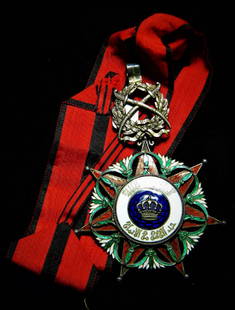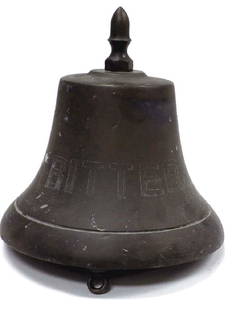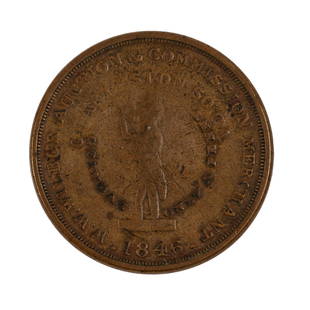
D. Farragut Orders for Court Martial Duty by Former Commander of USS Merrimac
Similar Sale History
View More Items in Militaria & War MemorabiliaRelated Militaria & War Memorabilia
More Items in Militaria & War Memorabilia
View MoreRecommended Collectibles
View More






Item Details
Description
David Farragut
Pensacola Bay, Florida, October 20, 1862
D. Farragut Orders for Court Martial Duty by Former Commander of USS Merrimac
LS
DAVID G. FARRAGUT, Manuscript Letter Signed, to Allen V. Reed, October 20, 1862, Flag Ship USS Hartford, Pensacola Bay, Florida. 1 p., 7.75" x 12.5". Expected folds; light foxing; very good. Accompanied by its original "Navy Department" transmittal envelope free franked by the Chief Clerk of the Navy Department, bearing the usual postal marks and cancellations.
With this brief letter from his Flagship, the USS Hartford, Rear Admiral David Farragut orders Lieutenant Allen V. Reed of the USS Potomac to report to Captain Robert B. Hitchcock, who would be conducting a general court-martial aboard the USS Susquehanna. Just before the war, Hitchcock had commanded the USS Merrimac. Confederates seized that ship in 1861, and it became the famous ironclad CSS Virginia, which in March 1862 dueled with the USS Monitor in the "Battle of the Ironclads" off Hampton Roads, Virginia. The court considered the cases of at least eight sailors and marines of the West Gulf Blockading Squadron, under the overall command of Admiral Farragut.
Complete Transcript
Flag Ship "Hartford,"
Pensacola Bay, Oct. 20th 1862.
Sir,
You will report yourself to Captain Robert B. Hitchcock, on board the U.S.S. "Susquehanna", for duty as a member of a General Court Martial to convene on October 21st, or as soon thereafter as practicable.
Very respectfully, / Your obdt. Servt.,
D. G. Farragut
Rear Admiral
Com'g W. G. B'g. Squad.
Lieutenant / Allen V. Reed
U.S. Store Ship "Potomac," / Pensacola Bay.
Historical Background
Captain Robert B. Hitchcock convened a general court-martial aboard the USS Susquehanna in Pensacola Bay in late October 1862. The court consisted of six members, including Hitchcock and Reed.
The first case they tried was that of Thomas Moakley, Landsman, of the US Mortar Schooner John Griffith. Moakley was charged with "Desertion to a Rebel." On August 20, 1862, Moakley received permission to leave the vessel for half an hour but did not return. He was subsequently found in civilian clothing with a deserting soldier and returned to the schooner on August 30. After examining witnesses, the court found Moakley guilty "except the words 'to a rebel'" and sentenced him to one year's confinement at hard labor in a penitentiary. The court added "having been induced to pass so lenient a sentence from their conviction of the simplicity of the character of the accused and of his inability to fully apprehend the enormity of his offence." He was sent home on October 30, 1862, rather than to a penitentiary.
The court also tried the case of T. H. Levensaler, Acting Master's Mate, of the US Mortar Schooner John Griffith, who was charged with (1) neglect of duty, and (2) disrespect in language and deportment to his superior officer. Levensaler pleaded not guilty, but the court found him not guilty of the first specification and guilty of the second specification of the first charge and guilty of the second charge. The court sentenced him to forfeit all pay due him and be dismissed from the Navy, effective November 29, 1862.
Among the other cases tried was that of Private Frederick Davey, Marine, of the USS Pensacola, who was charged with (1) using treasonable language, (2) fomenting a quarrel, and (3) assaulting his superior officer. On October 8, 1862, aboard the US Steam Sloop Pensacola, Davey was accused of saying, "I wish Jeff Davis would win all the battles" and "I would like to have the flag down to dance upon." When fellow Private Marine William Hare objected, Davey allegedly hit him with a vinegar bottle. When Sergeant of Marines James Shaw reproved him for the language he used, Davey attempted to strike Shaw.
On October 29, Davey pleaded guilty and submitted a written statement that concluded, "I'm throwing myself on the mercy of the Court, I would respectfully state that I am sorry and have always been a good Marine man, which, I think, was proved by my conduct in the engagement with Forts St. Phillip and Jackson; but I was in liquor at the time mentioned in the Charges, and while drunk and said things which I would have not dreamed of doing and saying had I been sober."
The next day, Davey examined Hare as a witness. Davey insisted that he had abused the Confederate flag, as there was at the time a boat passing with Confederate prisoners on board, but Hare replied, "I don't know what flag he meant, but I took it to be the American flag." Another witness testified that Davey had continued to man his gun after being wounded in the arm in an engagement with Forts St. Philip and Jackson in April 1862 on the Mississippi River below New Orleans.
After deliberation, the court found Davey guilty of all charges and sentenced him "to be confined in a penitentiary for two years at hard labor with loss of pay and then to be discharged from the Naval Service of the United States with bad conduct discharge."
On October 30, the court-martial also considered the case of Private James Gurley, Marine, of the USS Richmond, who was charged with leaving his post before being regularly relieved. On October 16, 1862, Gurley allegedly left his post at the cabin door to get his watch coat, and the Orderly Sergeant found him intoxicated on the Berth deck. Gurley pleaded guilty and threw himself on the mercy of the court. The court found Gurley guilty and sentenced him to thirty days of solitary confinement in the Navy Yard prison at Pensacola. Gurley continued to serve in the Marines until 1872, when he was medically discharged for a leg fracture he received in a "drunken brawl." After he left the Marines, he was employed at the Norfolk Naval Shipyard as a watchman.
The court-martial proceedings continued for several more days and considered the cases of James Becker, Acting Master's Mate, USS Sarah Bruen; Thomas Beasly, Seaman, USS Hartford; D. H. Hayden, Acting Master, USS Tennessee; and Thomas Ferris, Coal Heaver, USS Pembina.
David G. Farragut (1801-1870) was born in Tennessee to a Spanish father and a Scots-Irish American mother. He joined the Navy as a midshipman at the age of nine. He served in the War of 1812, and then in the West Indies working to eradicate piracy. He commanded a ship during the Mexican War as well. He moved from Norfolk, Virginia, to New York at the outset of the Civil War and went on to serve on the blockading fleet in the Gulf of Mexico. He rose to become the first rear admiral, first vice admiral, and first admiral in the U.S. Navy. (To that point, the navy had avoided what it considered a European aristocratic rank for seagoing commanders.). He is best known for his brash heroism in winning the Battle of Mobile Bay and the famous paraphrase, "Damn the torpedoes! Full speed ahead."
Allen V. Reed (1838-1917) was born in New York and joined the U.S. Navy as an Acting Midshipman in September 1854, appointed to the U.S. Naval Academy from Connecticut. He graduated from the Academy in 1858, along with future Admiral George Dewey (1837-1917). In February 1861, Reed became a Master, then gained promotion to Lieutenant in April 1861. In the first three years of the Civil War, he performed blockading duty in the Gulf of Mexico. He later commanded the USS Pawtuxet in attacks on Fort Fisher in North Carolina. He was rewarded for his service with a promotion to Lieutenant-Commander in March 1865. After the war, he served for a time as commandant of the Pensacola Navy Yard and the Portsmouth (NH) Navy Yard. He was promoted to Captain in July 1884 and retired at that grade in June 1896 as one of the Navy's senior captains with 42 years of service. In 1906, Congress passed a bill authorizing the promotion of Captain Reed to the rank of Rear Admiral, Retired. He is buried at Arlington National Cemetery.
Robert B. Hitchcock (1804-1888) was born in Connecticut and was appointed a Midshipman in the U.S. Navy in 1825. He received a series of promotions to Lieutenant (1835), Commander (1855), Captain (1861), and Commodore (1862). He served in the Pacific Fleet during the Mexican War and helped seize California for the United States. From 1858 to 1860, he commanded the USS Merrimac in the Pacific Squadron. The Merrimac was seized in 1861 by the Confederacy and converted into the ironclad CSS Virginia, which clashed with the Union Navy's USS Monitor in 1862 in the "Battle of the Ironclads." In 1862 and 1863, he commanded the US Steam Sloop Susquehanna in the Western Gulf Blockading Squadron. He served on ordnance duty in 1864-1865 and became commandant of the Boston Navy Yard in 1866.
This item comes with a Certificate from John Reznikoff, a premier authenticator for both major 3rd party authentication services, PSA and JSA (James Spence Authentications), as well as numerous auction houses.
WE PROVIDE IN-HOUSE SHIPPING WORLDWIDE.
7.75" x 12.5"
Pensacola Bay, Florida, October 20, 1862
D. Farragut Orders for Court Martial Duty by Former Commander of USS Merrimac
LS
DAVID G. FARRAGUT, Manuscript Letter Signed, to Allen V. Reed, October 20, 1862, Flag Ship USS Hartford, Pensacola Bay, Florida. 1 p., 7.75" x 12.5". Expected folds; light foxing; very good. Accompanied by its original "Navy Department" transmittal envelope free franked by the Chief Clerk of the Navy Department, bearing the usual postal marks and cancellations.
With this brief letter from his Flagship, the USS Hartford, Rear Admiral David Farragut orders Lieutenant Allen V. Reed of the USS Potomac to report to Captain Robert B. Hitchcock, who would be conducting a general court-martial aboard the USS Susquehanna. Just before the war, Hitchcock had commanded the USS Merrimac. Confederates seized that ship in 1861, and it became the famous ironclad CSS Virginia, which in March 1862 dueled with the USS Monitor in the "Battle of the Ironclads" off Hampton Roads, Virginia. The court considered the cases of at least eight sailors and marines of the West Gulf Blockading Squadron, under the overall command of Admiral Farragut.
Complete Transcript
Flag Ship "Hartford,"
Pensacola Bay, Oct. 20th 1862.
Sir,
You will report yourself to Captain Robert B. Hitchcock, on board the U.S.S. "Susquehanna", for duty as a member of a General Court Martial to convene on October 21st, or as soon thereafter as practicable.
Very respectfully, / Your obdt. Servt.,
D. G. Farragut
Rear Admiral
Com'g W. G. B'g. Squad.
Lieutenant / Allen V. Reed
U.S. Store Ship "Potomac," / Pensacola Bay.
Historical Background
Captain Robert B. Hitchcock convened a general court-martial aboard the USS Susquehanna in Pensacola Bay in late October 1862. The court consisted of six members, including Hitchcock and Reed.
The first case they tried was that of Thomas Moakley, Landsman, of the US Mortar Schooner John Griffith. Moakley was charged with "Desertion to a Rebel." On August 20, 1862, Moakley received permission to leave the vessel for half an hour but did not return. He was subsequently found in civilian clothing with a deserting soldier and returned to the schooner on August 30. After examining witnesses, the court found Moakley guilty "except the words 'to a rebel'" and sentenced him to one year's confinement at hard labor in a penitentiary. The court added "having been induced to pass so lenient a sentence from their conviction of the simplicity of the character of the accused and of his inability to fully apprehend the enormity of his offence." He was sent home on October 30, 1862, rather than to a penitentiary.
The court also tried the case of T. H. Levensaler, Acting Master's Mate, of the US Mortar Schooner John Griffith, who was charged with (1) neglect of duty, and (2) disrespect in language and deportment to his superior officer. Levensaler pleaded not guilty, but the court found him not guilty of the first specification and guilty of the second specification of the first charge and guilty of the second charge. The court sentenced him to forfeit all pay due him and be dismissed from the Navy, effective November 29, 1862.
Among the other cases tried was that of Private Frederick Davey, Marine, of the USS Pensacola, who was charged with (1) using treasonable language, (2) fomenting a quarrel, and (3) assaulting his superior officer. On October 8, 1862, aboard the US Steam Sloop Pensacola, Davey was accused of saying, "I wish Jeff Davis would win all the battles" and "I would like to have the flag down to dance upon." When fellow Private Marine William Hare objected, Davey allegedly hit him with a vinegar bottle. When Sergeant of Marines James Shaw reproved him for the language he used, Davey attempted to strike Shaw.
On October 29, Davey pleaded guilty and submitted a written statement that concluded, "I'm throwing myself on the mercy of the Court, I would respectfully state that I am sorry and have always been a good Marine man, which, I think, was proved by my conduct in the engagement with Forts St. Phillip and Jackson; but I was in liquor at the time mentioned in the Charges, and while drunk and said things which I would have not dreamed of doing and saying had I been sober."
The next day, Davey examined Hare as a witness. Davey insisted that he had abused the Confederate flag, as there was at the time a boat passing with Confederate prisoners on board, but Hare replied, "I don't know what flag he meant, but I took it to be the American flag." Another witness testified that Davey had continued to man his gun after being wounded in the arm in an engagement with Forts St. Philip and Jackson in April 1862 on the Mississippi River below New Orleans.
After deliberation, the court found Davey guilty of all charges and sentenced him "to be confined in a penitentiary for two years at hard labor with loss of pay and then to be discharged from the Naval Service of the United States with bad conduct discharge."
On October 30, the court-martial also considered the case of Private James Gurley, Marine, of the USS Richmond, who was charged with leaving his post before being regularly relieved. On October 16, 1862, Gurley allegedly left his post at the cabin door to get his watch coat, and the Orderly Sergeant found him intoxicated on the Berth deck. Gurley pleaded guilty and threw himself on the mercy of the court. The court found Gurley guilty and sentenced him to thirty days of solitary confinement in the Navy Yard prison at Pensacola. Gurley continued to serve in the Marines until 1872, when he was medically discharged for a leg fracture he received in a "drunken brawl." After he left the Marines, he was employed at the Norfolk Naval Shipyard as a watchman.
The court-martial proceedings continued for several more days and considered the cases of James Becker, Acting Master's Mate, USS Sarah Bruen; Thomas Beasly, Seaman, USS Hartford; D. H. Hayden, Acting Master, USS Tennessee; and Thomas Ferris, Coal Heaver, USS Pembina.
David G. Farragut (1801-1870) was born in Tennessee to a Spanish father and a Scots-Irish American mother. He joined the Navy as a midshipman at the age of nine. He served in the War of 1812, and then in the West Indies working to eradicate piracy. He commanded a ship during the Mexican War as well. He moved from Norfolk, Virginia, to New York at the outset of the Civil War and went on to serve on the blockading fleet in the Gulf of Mexico. He rose to become the first rear admiral, first vice admiral, and first admiral in the U.S. Navy. (To that point, the navy had avoided what it considered a European aristocratic rank for seagoing commanders.). He is best known for his brash heroism in winning the Battle of Mobile Bay and the famous paraphrase, "Damn the torpedoes! Full speed ahead."
Allen V. Reed (1838-1917) was born in New York and joined the U.S. Navy as an Acting Midshipman in September 1854, appointed to the U.S. Naval Academy from Connecticut. He graduated from the Academy in 1858, along with future Admiral George Dewey (1837-1917). In February 1861, Reed became a Master, then gained promotion to Lieutenant in April 1861. In the first three years of the Civil War, he performed blockading duty in the Gulf of Mexico. He later commanded the USS Pawtuxet in attacks on Fort Fisher in North Carolina. He was rewarded for his service with a promotion to Lieutenant-Commander in March 1865. After the war, he served for a time as commandant of the Pensacola Navy Yard and the Portsmouth (NH) Navy Yard. He was promoted to Captain in July 1884 and retired at that grade in June 1896 as one of the Navy's senior captains with 42 years of service. In 1906, Congress passed a bill authorizing the promotion of Captain Reed to the rank of Rear Admiral, Retired. He is buried at Arlington National Cemetery.
Robert B. Hitchcock (1804-1888) was born in Connecticut and was appointed a Midshipman in the U.S. Navy in 1825. He received a series of promotions to Lieutenant (1835), Commander (1855), Captain (1861), and Commodore (1862). He served in the Pacific Fleet during the Mexican War and helped seize California for the United States. From 1858 to 1860, he commanded the USS Merrimac in the Pacific Squadron. The Merrimac was seized in 1861 by the Confederacy and converted into the ironclad CSS Virginia, which clashed with the Union Navy's USS Monitor in 1862 in the "Battle of the Ironclads." In 1862 and 1863, he commanded the US Steam Sloop Susquehanna in the Western Gulf Blockading Squadron. He served on ordnance duty in 1864-1865 and became commandant of the Boston Navy Yard in 1866.
This item comes with a Certificate from John Reznikoff, a premier authenticator for both major 3rd party authentication services, PSA and JSA (James Spence Authentications), as well as numerous auction houses.
WE PROVIDE IN-HOUSE SHIPPING WORLDWIDE.
7.75" x 12.5"
Buyer's Premium
- 28%
D. Farragut Orders for Court Martial Duty by Former Commander of USS Merrimac
Estimate $300 - $400
Shipping & Pickup Options
Item located in Wilton, CT, usOffers In-House Shipping
Local Pickup Available
Payment
Accepts seamless payments through LiveAuctioneers

Auction Curated By

President
Related Searches
TOP






























![[WORLD WAR II]. USS Oklahoma life ring, ship sunk at Pearl Harbor. : [WORLD WAR II]. USS Oklahoma life ring, ship sunk at Pearl Harbor. Diameter approx. 25 in., ring width 6 in. painted life ring with rope, housed in wood shadowbox 35 x 35 in. with brass plaque (](https://p1.liveauctioneers.com/197/250551/130130062_1_x.jpg?height=310&quality=70&version=1654185975)






![[CIVIL WAR]. DAVIS, Jefferson (1808-1889). Signed CDV of the aged former CSA President. New Orleans,: [CIVIL WAR]. DAVIS, Jefferson (1808-1889). Signed CDV of the aged former CSA President. New Orleans, LA: W.W. Washburn, ca 1880s. 2 5/16 x 3 13/16 in. CDV on cardstock mount (toning, spotting, curved](https://p1.liveauctioneers.com/197/290818/154047522_1_x.jpg?height=310&quality=70&version=1685131750)




![[CIVIL WAR] USS Kearsarge Relic: Wood relic from the sternpost of the USS Kearsarge with a period note inscribed: “Oak from the stern-post of the Kearsarge which sank the Confederate cruiser Alabama. (The latter planted a shell](https://p1.liveauctioneers.com/7226/325455/175168992_1_x.jpg?height=310&quality=70&version=1712370394)
![[CIVIL WAR] Commander of Sharpshooters, Signed CDV : Vignetted bust-length albumen CDV portrait of Colonel Patrick Emmet Burke. Corinth, Mississippi: Armstead & White, n.d. Photographer's imprint to mount verso. INSCRIBED BY BURKE in ink to mount verso:](https://p1.liveauctioneers.com/7226/325455/175169063_1_x.jpg?height=310&quality=70&version=1712370394)



![[Civil War] General Orders For the Years 1862, 1863 & 1864, Including Preliminary Emancipation: Civil WarWashington, D.C., ca. 1863-1865[Civil War] General Orders For the Years 1862, 1863 & 1864, Including Preliminary Emancipation ProclamationBooksThree rare Civil War General Orders volumes for](https://p1.liveauctioneers.com/6306/327579/176471829_1_x.jpg?height=310&quality=70&version=1714074043)











![George Washington Signed Discharge: Partly printed discharge document signed by George Washington, as Commander in Chief of the Armies of the United States. Newburgh, [New York], 4 January 1783. 1 page, ## x ## in. Undersigned by Washin](https://p1.liveauctioneers.com/7226/322253/173251475_1_x.jpg?height=310&quality=70&version=1710004847)
![[Ambrotype] Texas Confederate Soldier: Sixth plate ambrotype. Full leatherette case. Portrait of a possible Texas Confederate soldier. A silver star device was used to pin up the brim of his light-toned headgear, a look often seen in image](https://p1.liveauctioneers.com/7226/322253/173251509_1_x.jpg?height=310&quality=70&version=1710004847)
![Captured Bowie Knife w/ Period Note of Provenance: Captured Confederate D-hilt Bowie knife. [Kenansville, North Carolina]: [Louis Froelich factory]. With original metal and leather sheath with affixed period notes. First note with only remnants. Secon](https://p1.liveauctioneers.com/7226/325455/175169154_1_x.jpg?height=310&quality=70&version=1712370394)
![[Civil War] Bullet Which Nearly Killed Soldier: Lead bullet encased in gold acorn fob with chain. Finely engraved: "W.D. Fiske / 14th Regt. C V / Fredericksburg / Dec 17, 1863." Acorn approx. 1 1/2 x 1 in. Overall length 6 1/2 in. Published in "Her](https://p1.liveauctioneers.com/7226/325455/175169103_1_x.jpg?height=310&quality=70&version=1712370394)

![[CIVIL WAR] 1st Texas Infantry in Camp: Outdoor half plate ambrotype of the 1st Texas Infantry. Full leatherette case. Significant, large half plate ambrotype of members of the 1st Texas Infantry at ‘Splinterville,’ the regiment’s win](https://p1.liveauctioneers.com/7226/322253/173251512_1_x.jpg?height=310&quality=70&version=1710004847)
![[HANCOCK, John] Washington’s Spy, Officer’s Commission: Partly printed document signed by John Hancock as President of the Continental Congress, for Epaphras Bull (1748-1781). [Philadelphia, Pennsylvania], 10 January 1777. 1 page, ## x ## in. Completed in](https://p1.liveauctioneers.com/7226/322253/173251471_1_x.jpg?height=310&quality=70&version=1710004847)
![[CIVIL WAR] Black Soldier & Wife: CDV-sized tintype photograph WITH gem-sized tintype. Full thermoplastic case. Portrait of an unknown African American Civil War soldier who holds the rank of sergeant. He looks directly at the camera](https://p1.liveauctioneers.com/7226/322253/173251671_1_x.jpg?height=310&quality=70&version=1710004847)
![Historic Einstein Signed Program from Lincoln University Visit: Conferences on Objectives. Lincoln University, [Oxford], Pennsylvania, 3 May 1946. SIGNED BY ALBERT EINSTEIN. Tipped into Horace Mann Bond (1904-1972). The Education of the Negro in the American Socia](https://p1.liveauctioneers.com/7226/322253/173251693_1_x.jpg?height=310&quality=70&version=1710004847)
![[Civil War] Cavalry Regiment's Colors : Regulation Civil War Cavalry Regimental flag, c. 1861-1865. Hand-painted and gilded on silk. Approx. 34 x 31 inches. Trimmed on three sides with gold silk fringe. Extremely fine Federal regulation han](https://p1.liveauctioneers.com/7226/325455/175169108_1_x.jpg?height=310&quality=70&version=1712370394)










